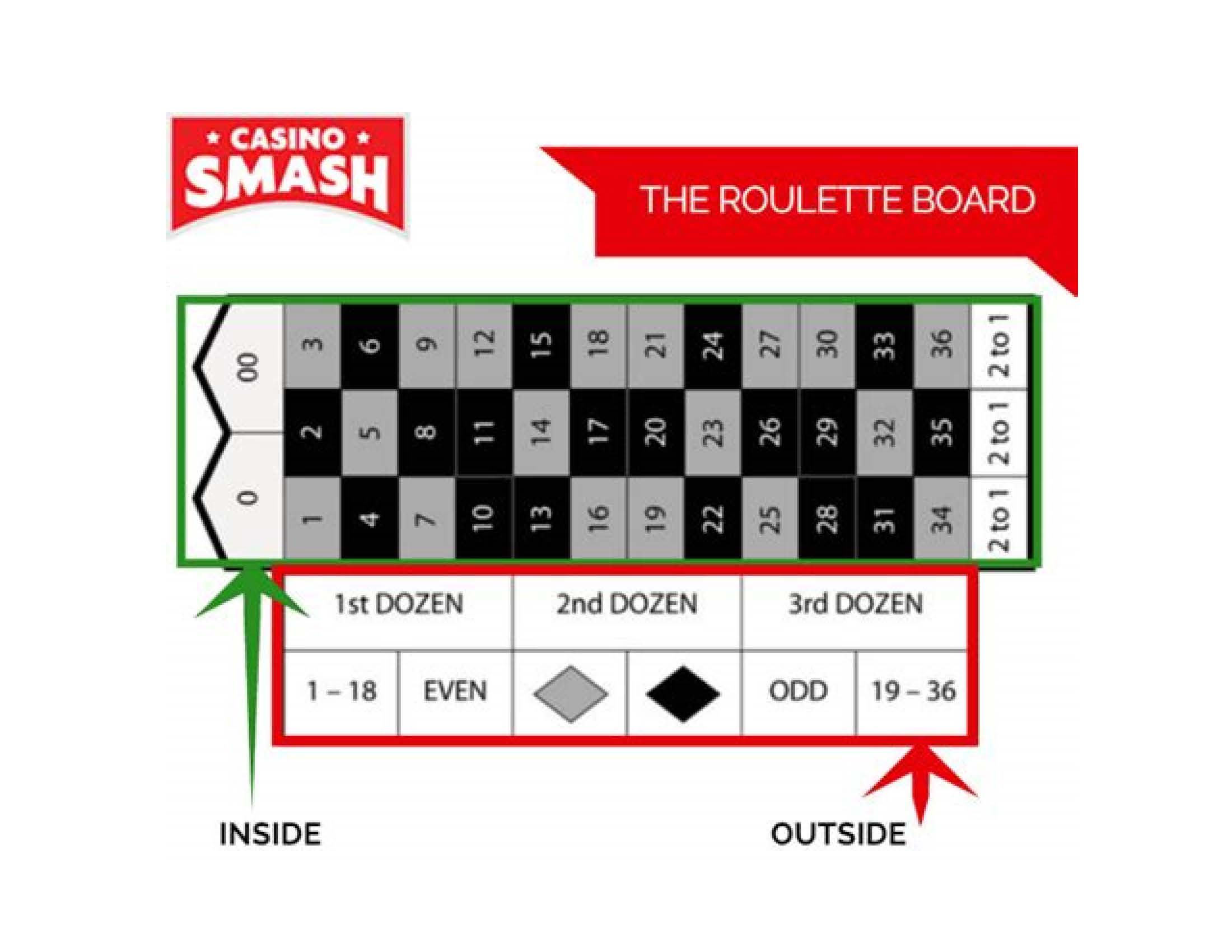Let’s Go to Vegas! - Understanding the Game of Roulette
Directions:
1) Look at the pictures of the Roulette table below
2) Watch the video IMPORTANT: The video does a great job of explaining the game, but the probability value listed are NOT accurate. You will calculate the probabilities yourself on the worksheet.
3) Read the content below
4) Complete the worksheet. Once again, do NOT use the probabilities mentioned in the video.




Understanding Roulette
Roulette is a casino game. In the game, players may choose to place bets on either a single number, various groupings of numbers, the colors red or black, whether the number is odd or even, or if the numbers are high (19–36) or low (1–18).
To determine the winning number and color, a wheel is spun in one direction, then a ball is spun in the opposite direction around a tilted circular track running around the outer edge of the wheel. The ball eventually loses momentum, passes through an area of deflectors, and falls onto the wheel and into one of 37 (in French/European style roulette) or 38 (in American style roulette) colored and numbered pockets on the wheel.
How Betting Works in Roulette
Outside Bets
Red or black: There are 18 numbers with red backgrounds and 18 with black backgrounds. A bet on red pays off if the ball stops in the slot by any of the 18 red numbers; a bet on black pays off if the ball lands on any of the black numbers. A winning red or black bet pays even money -- the player keeps the original bet and gets an equal amount in winnings.
Odd or even: Another even-money bet. The player is betting that either one of the 18 odd numbers (1, 3, 5, and so forth) or one of the 18 even numbers (2, 4, 6, and so forth) will be chosen.
1 through 18, 19 through 36: Also for even money, a bet on whether the ball will stop on any of the first 18 numbers or any of the last 18 numbers.
The house gets its edge from 0 and 00 -- they are neither red nor black, neither odd nor even, neither part of the first 18 nor the last 18. If the ball lands on 0 or 00, all even-money bets -- in fact, all outside bets -- lose.
In casinos offering a French wheel with the en prison rule, the player does not lose an even money bet when the 0 comes up. Instead, the bet is "in prison" -- the player does not lose the wager, but it remains in effect for the next spin. If the bet wins on the next spin, it is released, and the player may pull it back. The bet may not remain in prison on consecutive spins -- a second consecutive 0 makes the bet a loser. This is a very favorable rule for the player, and one that is rare in the United States.
Dozens: Wagers on the first 12 numbers, second 12, or third 12 pay 2-1.
Columns: Wagers on any of the three columns on the grid pay 2-1. Because the grid is arranged in 12 rows of three consecutive numbers (1-2-3 is the first row, 4-5-6 the second, and so on), each number in a column is three higher than the one before.
Inside Bets
Single number: Bets on individual numbers, including 0 and 00, are placed by putting a chip or chips fully inside a numbered box. If a single-number bet hits, it pays 35-1. (Remember, however, that the true odds are 37-1.)
Split: This is a wager on two numbers, and it pays 17-1. Make a split bet by placing a chip so that it straddles the line between two numbers.
Street: A three-number bet, paying 11-1, is made by placing a chip on the line separating outside bets from the inside, indicating a row of three consecutive numbers.
Corner: A chip is placed at the intersection of a horizontal line with a vertical line inside the layout. This indicates a bet on the four adjacent numbers, and it pays 8-1.
Five-number: For the worst bet on the table, place a chip so that it lies on the line separating the inside from the outside, while straddling the horizontal line between 0-00 and 1-2-3. This bet pays 6-1 and carries a 7.89 percent house edge. The five-number bet does not exist on the French wheel because of the absence of 00.
Double street: Just as on the street bet, place a chip on the line separating the outside from the inside, but let it straddle the horizontal line between two rows. That gives you six numbers in two consecutive three-number rows, and the bet pays 5-1.
Special note: Watch for your payoffs. On winning inside bets, most dealers will push the winnings to you but leave the original bet in place. After the dealer has finished payoffs and is ready for the next round of bets, it is up to you to move the original bet if you do not want to make the same wager. Some dealers will leave the winnings on the layout, and if you do not wish to bet it all on the next spin, you must remove it. It is common for the dealer to leave the winnings on outside bets next to the original bet. It is up to you to move the chips when the dealer is ready.